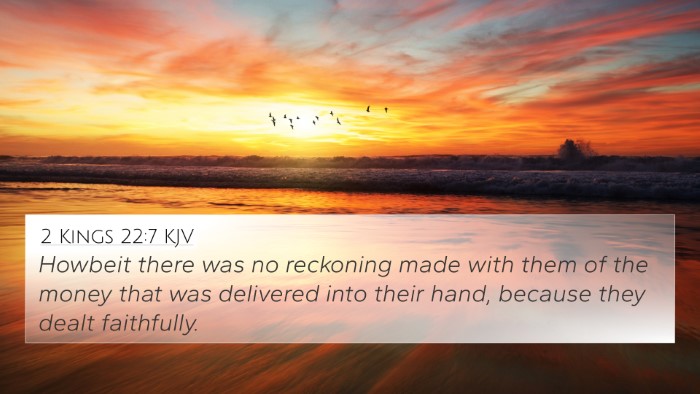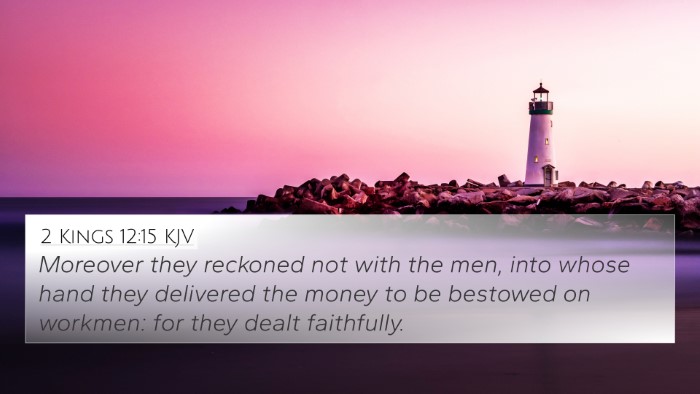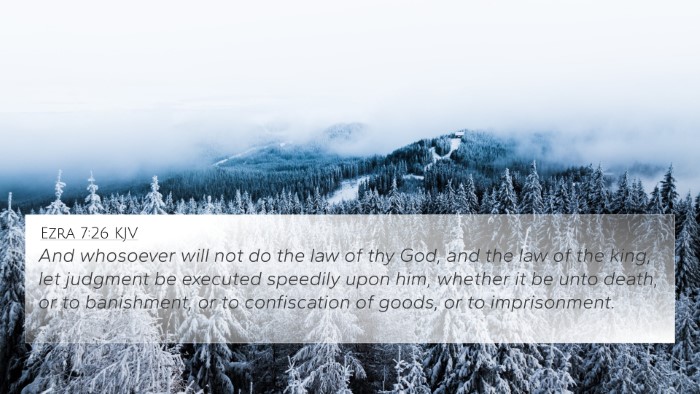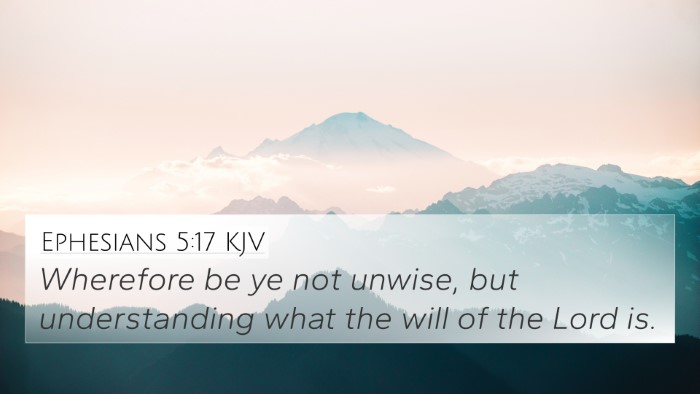Old Testament
Genesis Exodus Leviticus Numbers Deuteronomy Joshua Judges Ruth 1 Samuel 2 Samuel 1 Kings 2 Kings 1 Chronicles 2 Chronicles Ezra Nehemiah Esther Job Psalms Proverbs Ecclesiastes Song of Solomon Isaiah Jeremiah Lamentations Ezekiel Daniel Hosea Joel Amos Obadiah Jonah Micah Nahum Habakkuk Zephaniah Haggai Zechariah MalachiEzra 7:18 Similar Verses
Ezra 7:18 Cross References
And whatsoever shall seem good to thee, and to thy brethren, to do with the rest of the silver and the gold, that do after the will of your God.
Uncover the Rich Themes and Topics of This Bible Verse
Listed below are the Bible themes associated with Ezra 7:18. We invite you to explore each theme to gain deeper insights into the Scriptures.
Ezra 7:18 Cross Reference Verses
This section features a detailed cross-reference designed to enrich your understanding of the Scriptures. Below, you will find carefully selected verses that echo the themes and teachings related to Ezra 7:18 KJV. Click on any image to explore detailed analyses of related Bible verses and uncover deeper theological insights.

2 Kings 22:7 (KJV) »
Howbeit there was no reckoning made with them of the money that was delivered into their hand, because they dealt faithfully.

2 Kings 12:15 (KJV) »
Moreover they reckoned not with the men, into whose hand they delivered the money to be bestowed on workmen: for they dealt faithfully.

Ezra 7:26 (KJV) »
And whosoever will not do the law of thy God, and the law of the king, let judgment be executed speedily upon him, whether it be unto death, or to banishment, or to confiscation of goods, or to imprisonment.
Ezra 7:18 Verse Analysis and Similar Verses
Meaning of Ezra 7:18
Ezra 7:18 reads: "And whatever seems good to you and your brethren to do with the rest of the silver and the gold, do according to the will of your God."
This verse exemplifies the divine guidance and trust in God's providence as Ezra addresses the leaders and priests who accompany him. It indicates a principle of stewardship and responsibility toward God's resources and divine instruction.
Summary of Insights from Commentaries
-
Matthew Henry
Henry emphasizes that this verse highlights the necessity of seeking God’s guidance in financial matters and charitable actions. It suggests that leaders should act in harmony with God’s will and the spiritual condition of the people.
-
Albert Barnes
Barnes interprets this verse as an encouragement for Ezra and his followers to be diligent and discerning in their use of the resources provided to them. He notes that it also reflects a mutual understanding among the priests, as they engage in a combined effort to honor God with their choices.
-
Adam Clarke
Clarke points out that Ezra's request is an appeal to collaborative leadership. He underlines that the shared decision-making relied on a community consensus and sought to implement God's will through collective choice.
Bible Verse Cross-References
- Proverbs 3:5-6 - Trust in the Lord with all your heart.
- James 1:5 - If any of you lacks wisdom, let him ask of God.
- 1 Peter 4:10 - Each one should use whatever gift he has received to serve others.
- Mark 12:41-44 - Jesus observes the widow's offering, emphasizing sacrificial giving.
- 2 Corinthians 9:7 - God loves a cheerful giver.
- Philippians 4:19 - And my God will meet all your needs according to the riches of his glory.
- Luke 16:10 - Whoever can be trusted with very little can also be trusted with much.
Inter-Biblical Dialogue and Themes
The connections between passages reveal a consistent theme of divine guidance in stewardship. Ezra 7:18, in the larger narrative context, invites contemplation of how resources should be deployed in accordance with God’s desires.
- Connections can be drawn to themes of service and generosity.
- The verse reinforces a core Biblical principle of stewardship and accountability.
- It illustrates the call for wisdom in decision-making as echoed in Proverbs and James.
Application and Reflection
Reflecting on Ezra 7:18 prompts believers to consider how they approach the management of resources in their own lives. Are we inviting God into our decision-making processes? Are we collectively discerning God's will within our communities?
Learning from Cross-Referencing Bible Texts
Understanding Ezra 7:18 alongside related scriptures fosters a depth of insight into Biblical stewardship. Tools for Bible cross-referencing allow us to see how various passages inform one another, enhancing our understanding of God's expectations concerning faithfulness and service.
Potential Study Questions
- What practical steps can we take to apply the principles of stewardship found in Ezra 7:18?
- How do the various themes present in the cross-references deepen our understanding of divine guidance?
- In what ways does communal decision-making reflect Biblical principles illustrated in Ezra 7:18?
Conclusion
In summary, Ezra 7:18 acts as a pivotal reminder of the importance of seeking God’s will when making decisions, especially regarding stewardship of resources. Cross-referencing this verse with others enriches our comprehension and application of Biblical teachings in everyday life.
Further Exploration
Those interested in deeper insights can utilize a bible concordance or bible cross-reference guide to discover connections between Ezra 7:18 and other scriptures, enhancing their understanding of God’s Word and fostering a richer spiritual practice.



